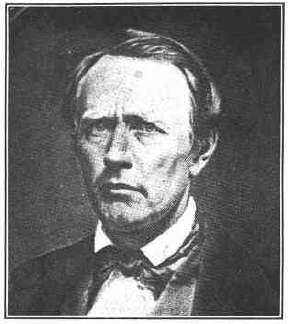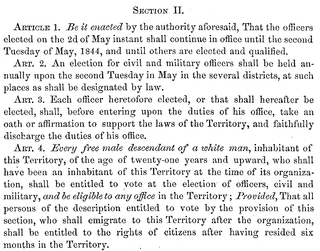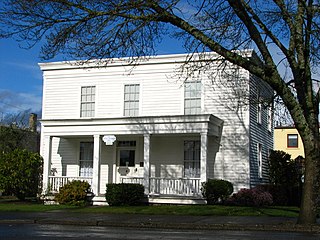Related Research Articles

John McLoughlin, baptized Jean-Baptiste McLoughlin, was a French-Canadian, later American, Chief Factor and Superintendent of the Columbia District of the Hudson's Bay Company at Fort Vancouver from 1824 to 1845. He was later known as the "Father of Oregon" for his role in assisting the American cause in the Oregon Country. In the late 1840s, his general store in Oregon City was famous as the last stop on the Oregon Trail.

Champoeg is a former town in the U.S. state of Oregon. Now a ghost town, it was an important settlement in the Willamette Valley in the early 1840s. Located halfway between Oregon City and Salem, it was the site of the first provisional government of the Oregon Country.

George Abernethy was an American politician, pioneer, notable entrepreneur, and first governor of Oregon under the provisional government based in the Willamette Valley, an area later a part of the American state of Oregon. He traveled to Oregon Country as a secular member of the Methodist mission, where he became involved in politics and helped found the first American newspaper west of the Rocky Mountains.

The history of the city of Portland, Oregon, began in 1843 when business partners William Overton and Asa Lovejoy filed to claim land on the west bank of the Willamette River in Oregon Country. In 1845 the name of Portland was chosen for this community by coin toss. February 8, 1851, the city was incorporated. Portland has continued to grow in size and population, with the 2010 Census showing 583,776 residents in the city.

Benjamin Stark was an American merchant and politician in Oregon. A native of Louisiana, he purchased some of the original tracts of land for the city of Portland. He later served in the Oregon House of Representatives before appointment to the United States Senate in 1860 after the death of Edward D. Baker. A Democrat, Stark served in the Senate from 1861 to 1862. He later served in the Connecticut House of Representatives.

Asa Lawrence Lovejoy was an American pioneer and politician in the region that would become the U.S. state of Oregon. He is best remembered as a founder of the city of Portland, Oregon. He was an attorney in Boston, Massachusetts before traveling by land to Oregon; he was a legislator in the Provisional Government of Oregon, mayor of Oregon City, and a general during the Cayuse War that followed the Whitman massacre in 1847. He was also a candidate for Provisional Governor in 1847, before the Oregon Territory was founded, but lost that election.

Francis William Pettygrove was a pioneer and one of the founders of the cities of Portland, Oregon, and Port Townsend, Washington. Born in Maine, he re-located to the Oregon Country in 1843 to establish a store in Oregon City. Later that year he paid $50 for half of a land claim on which he and Asa Lovejoy laid out a town named Portland after the port city in Pettygrove's home state. Lovejoy preferred Boston, but Pettygrove won a coin toss giving him the right to choose the name.
The Oregon Lyceum or Pioneer Lyceum and Literary Club was founded in Oregon City, Oregon Country around 1840. The forum was a prominent fixture for the leading pioneer settlers during its brief existence. It would begin publishing the first American newspaper west of the Rocky Mountains in 1846 and had several names during its existence.

The Provisional Government of Oregon was a popularly elected settler government created in the Oregon Country, in the Pacific Northwest region of North America. Its formation had been advanced at the Champoeg Meetings since February 17, 1841, and it existed from May 2, 1843 until March 3, 1849, and provided a legal system and a common defense amongst the mostly American pioneers settling an area then inhabited by the many Indigenous Nations. Much of the region's geography and many of the Natives were not known by people of European descent until several exploratory tours were authorized at the turn of the 18th and 19th centuries. The Organic Laws of Oregon were adopted in 1843 with its preamble stating that settlers only agreed to the laws "until such time as the United States of America extend their jurisdiction over us". According to a message from the government in 1844, the rising settler population was beginning to flourish among the "savages", who were "the chief obstruction to the entrance of civilization" in a land of "ignorance and idolatry".

William Holden Willson was a pioneer of the U.S. state of Oregon and the founder of its capital city, Salem. A native of New Hampshire, he immigrated to the Oregon Country in 1837 to work at the Methodist Mission, and there would participate in the Champoeg Meetings. Willson served as the first treasurer of the Provisional Government of Oregon.

The Organic Laws of Oregon were two sets of legislation passed in the 1840s by a group of primarily American settlers based in the Willamette Valley. These laws were drafted after the Champoeg Meetings and created the structure of a government in the Oregon Country. At the last Champoeg Meeting in May 1843, the majority voted to create what became the Provisional Government of Oregon. Laws were drafted by the committee and accepted by a popular vote in July. These laws were reformed by a second version in 1845.

Lone Fir Cemetery, in the southeast section of Portland, Oregon, United States, is a cemetery owned and maintained by Metro, a regional government entity. Listed on the National Register of Historic Places, the first burial was in 1846 with the cemetery established in 1855. Lone Fir has over 25,000 burials spread over more than 30 acres (120,000 m2).
Albert E. "A.E." Wilson was an American pioneer and merchant in Oregon Country. Raised in the United States, he moved to what would become the U.S. state of Oregon where he operated stores, was involved in politics, and was elected as the first judge of the Provisional Government of Oregon.

Harvey L. Clarke was an educator, missionary, and settler first on the North Tualatin Plains which would become Glencoe, Oregon, and then on the West Tualatin Plains that would become Forest Grove, Oregon. A native of Vermont, he moved to the Oregon Country in 1840 where he participated at the Champoeg Meetings, May 2, 1843, and helped to found Tualatin Academy that later became Pacific University. Clarke also worked for the Methodist Mission and was a chaplain for the Provisional Legislature of Oregon in 1845.

The Portland Penny is the name subsequently given to a specific copper matron head one-cent coin, used to decide the name of Portland, Oregon, United States.
Alonzo Gesner was an American land surveyor, Indian agent, and politician in the state of Oregon. A native of Illinois, he immigrated as a boy to the Oregon Country with his family where he became a deputy surveyor for the United States government. A Republican, he also was appointed as an Indian agent to the Warm Springs Reservation and later was a member of the Oregon State Senate.

The Francis Ermatinger House is located in Oregon City, Oregon, United States. Built by Francis Ermatinger in 1843, it is the oldest house in Clackamas County. It was placed on the National Register of Historic Places in 1977, and has been operated as a museum.
John Lindsey Morrison arrived in Oregon Country in 1842 along with other famous Oregon pioneers Medorem Crawford, Asa Lovejoy, and Sidney Moss, in the same wagon train. Morrison built the home of Francis Pettygrove in early Portland, Oregon, in 1846. The street on which Pettygrove's house was located was named in honor of Morrison. The first Morrison Street Bridge, crossing the Willamette River into East Portland, has been said to be named after Morrison, but alternatively it has been stated that the bridge simply took the name of the street that had been named for Morrison.
The following is a timeline of the history of the city of Portland, Oregon, United States.

James Terwilliger was an Oregon pioneer and one of the first residents of Portland, Oregon. He is the namesake of Portland's Terwilliger Boulevard and Terwilliger School.
References
- 1 2 3 4 5 Scott, Harvey (1890). History of Portland Oregon. D. Mason & Co., Syracuse.
- ↑ Lovejoy, Asa L.; Henry E. Reed (Sep 1930). "Lovejoy's Pioneer Narrative, 1842-48". Oregon Historical Quarterly. 31 (3): 237.
- ↑ Joel Palmer (1847). Journal of Travels Over the Rocky Mountains. Ye Galleon Press. p. 172. ISBN 978-0-87770-299-3 . Retrieved 2009-03-18.
- ↑ Bagley, Clarence Booth (1913). . Oregon Historical Society. p. 215.
{{cite book}}:|work=ignored (help) - ↑ Minto, John (1911). "What I know of Dr. McLoughlin and how I know it". Oregon Historical Quarterly. W.H Leeds, State Printer. XI: 192.
- ↑ Victor, Frances Fuller. . In Hubert Howe Bancroft (ed.). . Vol. 1.
- ↑ MacColl, Kimbark E. (1988). Merchants, Money, & Power: The Portland Establishment 1843-1913 . The Georgian Press. pp. 6–7. ISBN 0-9603408-3-1.
- ↑ "William Overton". www.oregonencyclopedia.org. Retrieved 2024-02-08.